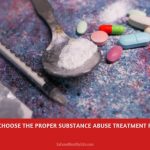
Addiction is a disorder that has different effects on those it afflicts. That’s why there’s no such thing as a singular, universal response to the condition.
Instead, the type of treatment depends on numerous factors. These include the type of substance that the user is addicted to, the severity of the addiction, and the recovering user’s level of commitment, to name a few.
Whether you want to find the best drug rehab center or enroll in alternative therapy programs, it’s a good idea to do as much research as possible first. That way, you can determine what would be best for your specific needs.
Below, we’ll discuss some of the most commonly available addiction treatment options as well as their pros and cons:
Drug and Alcohol Detox
Detoxification (or detox) is often the first step when it comes to addiction treatment Texas. Its primary purpose is to clear drugs or alcohol from the user’s body while suppressing or limiting their reactions to substance withdrawal. Related.
Withdrawal symptoms can present themselves in many ways, all with varying degrees of seriousness and intensity.
The length of the detoxification phase can also differ from person to person. Additionally, the types of symptoms that patients may experience depend on several factors.
These include the type of substance that the user was addicted to, how long they were addicted to it, the severity of the addiction, the method with which the substance was abused, and so on.
While it is possible to detox on one’s own, this practice is not usually recommended. Even the most common symptoms of withdrawal (such as nausea and vomiting) can quickly turn fatal without medical supervision.
Counseling and Behavioral Therapy

Photo by Priscilla Du Preez from Unsplash
As opposed to treatments that address one’s physical dependence on drugs or alcohol, addiction counseling and behavioral therapy focus on a patient’s attitudes and behaviors towards substance use.
This is done by identifying and resolving underlying issues that cause a patient to turn to addictive substances, which can help them recognize and manage their triggers.
Additionally, these treatment methods also reinforce certain life skills to encourage abstinence, with the end goal of preventing former users from relapsing into destructive habits.
Like detox, addiction and counseling are often used in conjunction with other forms of addiction treatment. It is especially effective in treating recovering addicts who also suffer from co-occurring conditions such as bipolar disorder and post-traumatic stress disorder.
The same goes for patients who struggle with severe mental illnesses such as obsessive-compulsive disorder.
Inpatient Drug or Alcohol Rehabilitation
For most people, going to rehab means enrolling in an inpatient rehabilitation program. At these intensive residential programs, patients check themselves into tightly controlled facilities staffed with professionals.
There, patients can receive round-the-clock medical care and emotional support throughout the entire rehabilitation process, from detoxification to sobriety.
Indeed, checking yourself into an inpatient rehabilitation facility can be remarkably advantageous.
In addition to 24/7 access to medical personnel and support staff, recovering users can benefit from the added structure and stability of these centers’ available treatment programs.
Inpatient rehab can also protect the patient from external triggers or distractions that could hinder their healing and recuperation process.
That being said, staying at such residential facilities will require a significant time investment, as most inpatient programs can run anywhere from 30 days to six months.
They can also be costlier than most other addiction treatment options, which may make them less accessible to some.
Outpatient Drug or Alcohol Rehabilitation
Unlike addiction treatment programs at inpatient residential facilities, outpatient or residential rehab does not require recovering users to stay within the rehab facility at all times.
Instead, they allow a patient to continue staying at home or at a sober living facility, only requiring them to attend substance abuse treatment sessions during the day.
It is considered a less disruptive way to do rehab, as the patient is free to attend to their usual daily responsibilities while in recovery.
It is also less costly than inpatient rehab, as the patient is not required to pay out of pocket for lodging.
Finally, outpatient rehab programs encourage recovering addicts to depend on their preferred support channels throughout the healing process.
Hence, they can stay in touch with family members, friend groups, and significant others while getting clean.
This form of treatment is suitable for individuals who suffer from a mild addiction problem, or one that is in its early stages.
It is also the best option for addicts who would like to get on the wagon but require a bit of flexibility to accommodate their day-to-day routines and obligations.
Being discerning and finding the right treatment program is key to a successful recovery.
Indeed, as long as patients receive adequate support, it’s more than possible to break free from substance dependence.
So if you or a loved one need help to overcome a substance abuse disorder, we hope that this article can help you choose the best outpatient treatment program.
About The Author:
Stacey Smith is a freelance health writer. She is passionate to write about women’s health, dental health, diabetes, endocrinology, and nutrition and provides in-depth features on the latest in health news for medical clinics and health magazines.




